617 Search Results for tell me about it
July 13, 2013
by Robin Parker -
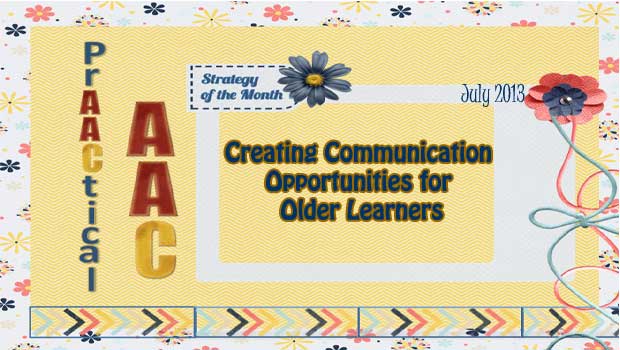
The Strategy of the Month involves AAC and the ‘older learner’. The ‘older learner’ involves a range of ages (We are ‘older learners’ for way longer than we are children) as well as a wide range of functioning levels. Even with this variation though, we know that ALL older learners can learn. There are challenges with ‘older learners’ that need to be addressed in order to facilitate spontaneous and generative communication and language. The challenges may result from years and years of going to intervention (some of it effective, some not), from perceived failure by the learner and/or the professionals, or may even just be related to that ‘teenager or adult’ independent streak. These challenges can definitely be overcome in order to help develop a functional and robust communication system for ALL learners. Just remember respect the learner as a competent teenager or adult (e.g., think what a typical language... [Read More...]
July 11, 2013
by Robin Parker -
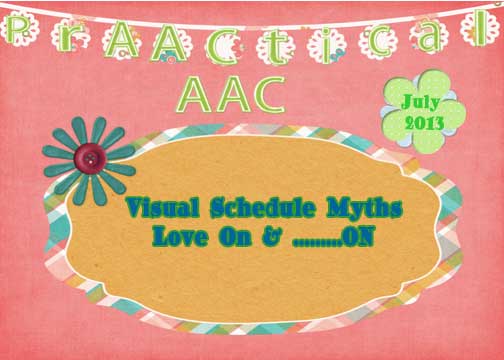
There are many myths about visual schedules for learners with special needs. Those myths multiply for older learners as well as for learners who are thought to have higher or lower skills. It is amusing to us (in a not really funny way) that these myths don’t typically extend to the SLP’s, educators, or other professionals and THEIR schedules/day planners. We have heard a lot of visual schedule myths in the last couple of weeks, which means the topic may need some re-visiting. Here are some TRUTHS about visual schedules. Please share if these myths come up in your area. Visual Schedules Increase INDEPENDENCE– Independence is supported when you can follow a visual schedule and do not need another person with you to tell you the steps to complete a day or a task. Independence is also facilitated when you can check for yourself when an event is happening rather than... [Read More...]
July 8, 2013
by Robin Parker -
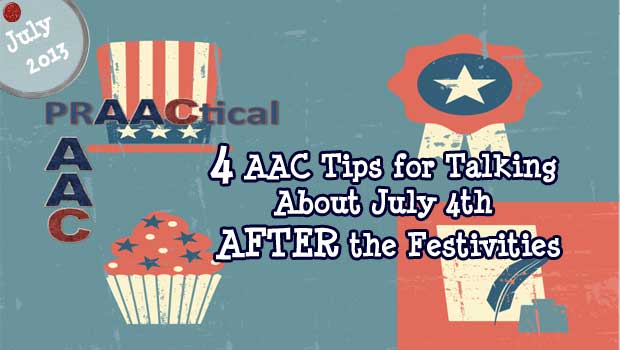
Make a Plan – Schedule a time to ‘talk about the past event (July 4th). The plan can include a ‘talk time’ or a time to collect remnants, photos, or related items from the event. Use a calendar or schedule to plan AAC style. Put Together A ‘Talking’ Photo Album– Gather all the photos from the activity and put together a talking photo album. You can use any talking photo album where you record a voice or use a story creation app that has recorded (digitized) or computer generated speech (synthesized). The process of making the photo album can be the ‘past event’ conversation and/or a review/reading can be the ‘conversation’. For some learners, turning the pages is the beginning of talking about past events while for other learners the pictures will be the opportunity for the conversation. It is helpful to use text and speech as you create the... [Read More...]
July 6, 2013
by Carole Zangari -
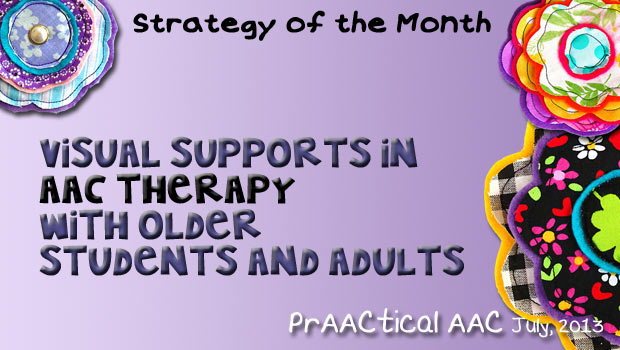
When learners are still struggling with communication in their teenage years and beyond, it means we have a lot of catching up to do. There are lots of implications for us as SLPs, of course, but the main one is this: Every interaction should have a purpose. As we head to the waiting room or classroom to see this student, we’re focused on how we can elicit practice on meaningful skills in the next few minutes. On a good day, we can use these few minutes before the session productively. Before we get to the therapy room we try to: use expectant pauses and graduated prompting to elicit a greeting at his/her highest level engage him/her in conversation to practice social exchanges provide opportunities for him/her to respond to a non-obligatory communicative context and facilitate a response make basic requests, like asking for help to open the door that we’ve... [Read More...]
June 8, 2013
by Robin Parker -
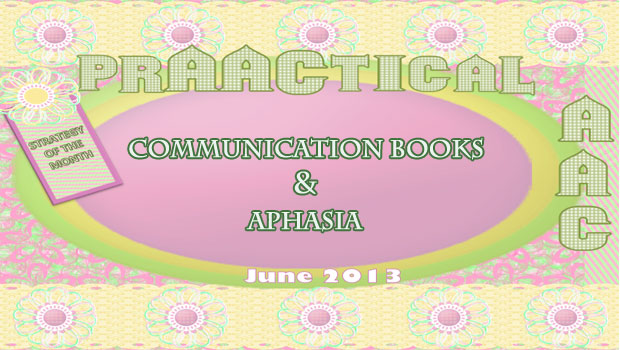
We know aphasia intervention has moved well beyond traditional speech and language training and intervention. We are so happy it has moved to an authentic participation, functional communication, and social interaction focus. Communication books are one tool for helping people with aphasia be active participants in conversation and comprehensive communication. Here are some thoughts and ideas about communication books to get started. Communication Books- Communication books for adults with aphasia can be in grid format with relevant communication messages. There can be a few pages or many, but keep in mind that the more pages, the longer it will take to navigate. It is most important to include high priority and relevant messages that will support needed communication and not just ‘standard’ messages. There are many samples and templates that can be purchased or downloaded for adult communication books. These may be good as a start, but should be individualized when... [Read More...]
June 5, 2013
by Robin Parker -

Strategy of The Month Communication Boards: Colorful Considerations Communication Boards Can Be Used For…. A Lot I Made A Communication Board: Bow What Join Together: Core & Fringe Vocabulary Fresh Look AAC in the Classroom with Joan Bruno Friendship Skills for Children Who Use AAC with Dr. Erinn Finke Top 5 Switches for People With ALS by Amy Roman AAC & Dementia with Dr. Melanie Fried Oken AAC for Children Who Have Rett Syndrome with Dr. Theresa Bartolotta AACtual TherapyHow We Do It Essential Tricks for Supporting AAC in Schools, Part 2 PrAACtical Look: AAC at Dynamic Therapy Associates by Vicki Clarke A Framework for Success Getting Started in the Exciting World of Communication & AAC with Marlene Cummings AAC Myth Buster Wrap-Up PrAActical Thinking It’s PrAACtically Better Hearing & Speech Month 30 Posts You May Have Missed for Autism Awareness Month It’s PrAACtically Mother’s Day- 5 Activities that Support... [Read More...]
May 24, 2013
by Carole Zangari -
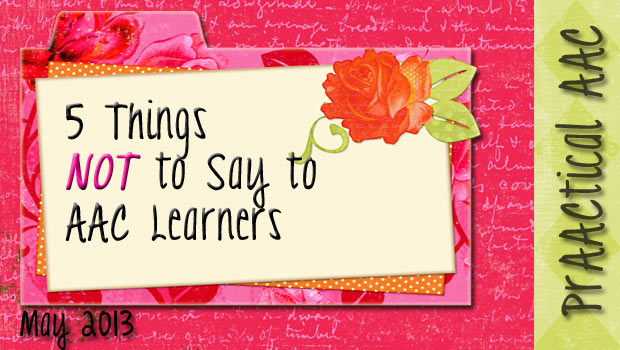
People who are learning to express themselves with AAC need to build their self-concept as competent communicators. One of the ways we can support that process is by being careful about the ways in which we refer to their communication. Here are a few things we try to avoid saying. “Show me [on your device].” (Instead, build the language of communication, with directives such as “Tell me” or “Say it.”) “Press the switch.” (Instead, refer to the function that the switch is being used for. E.g., “Make it go”) See Ian Bean’s great post on this subject. “Tell me on your talker.” (If they tell you one way, and you understood the message…celebrate, reward, and encourage! If you make them repeat themselves using a different strategy, they may come to view communication using AAC as a chore. And that’s not so good for motivation…) “I know you can do it.... [Read More...]
May 22, 2013
by Robin Parker -
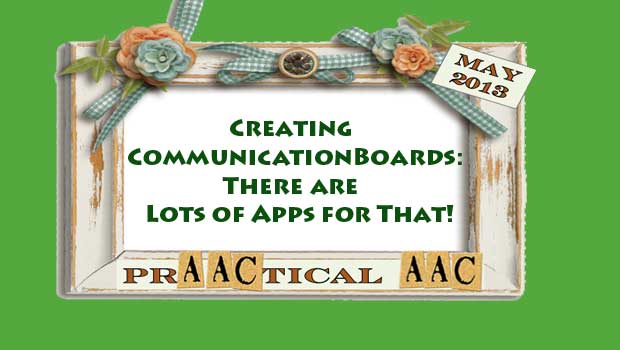
To continue on with the theme of the month, here are some app (and computer based) resources for easily creating your own communication boards: Pogo Boards Pogo Boards is a communication board creator for both the computer and the iOS platform. You can make traditional grid-based communication boards and a variety of other visual supports. Pogo Boards also has a variety of pre-made boards that users share. Price: – Free trial period with premium account, then Free basic account, Subscription price for ongoing premium account Symbly Go & Symbly Symbly is a computer based communication board creator. Communication boards are super easy to create, share, and print out. Symbly Go is an iOS platform app that allows you to view your communication boards (and other visual supports) on your iPad. Your communication boards will automatically be downloaded to your iPad (even when there’s no Internet connection available). There is text to speech capability if... [Read More...]
May 20, 2013
by Carole Zangari -
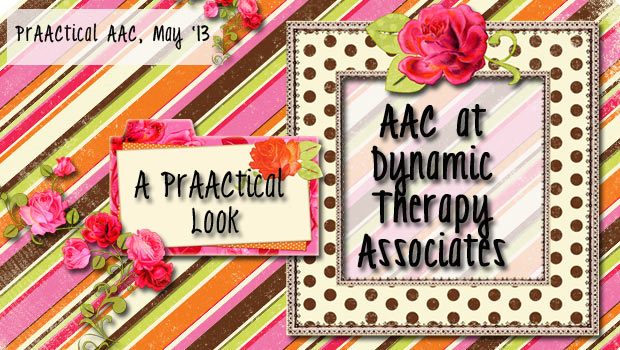
We’re so excited to continue our PrAACtical Look series with a guest post from Vicki Clarke, who is the CEO of Dynamic Therapy Associates, a speech language therapy clinic in Kennesaw, Georgia. Vicki specializes in AAC, conducting local and national device evaluations, consultations, treatments and trainings for individuals, clinics, school systems and professional organizations and manufacturers. Vicki has a wealth of knowledge in the prAACtical aspect of AAC service provision and shares a tiny bit of that with us in this post about preparing clients who use AAC for medical encounters. :::::::::::::::::::::::::::::::::::::::::::::::::::::::::::::::::::::::::::::::::::::::::::::::::::: I was asked to contribute a “favorite therapy activity” kind of post to this blog a few months ago. Decisions, decisions, decisions….I love Arts & Crafts Therapy, Cooking Therapy, iPad Therapy, Shopping Therapy, and Hang-Around-And-Chat Therapy but what to share? I mulled it over and I decided on “Serious Medical Procedure Preparation Therapy.” Fun stuff, right?!!? We do a lot... [Read More...]
May 18, 2013
by Carole Zangari -
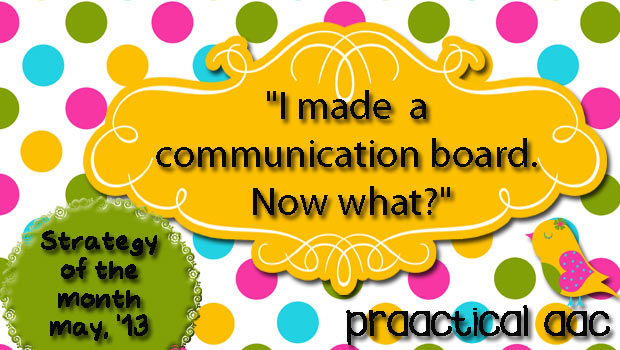
Earlier this month, we shared some ideas for making communication boards using color coding and also for creating boards geared to different communicative purposes. Making the communication board according to some basic principles is a good thing, of course, and it takes a decent amount of thought and planning. Even more important, though, is developing an intervention plan so that the augmentative communicator learns how to use the board effectively. Here are some of our thoughts on how to teach someone to use a new communication board. Model It We’ve talked about aided language input so many times that I’m almost embarrassed to mention it. Almost. The truth is, it is a ‘must do’ strategy when we’re first introducing a communication board, book, SGD, or AAC app. Incidental learning is important for just about all of the people with whom we work. It is never the only strategy we use,... [Read More...]









